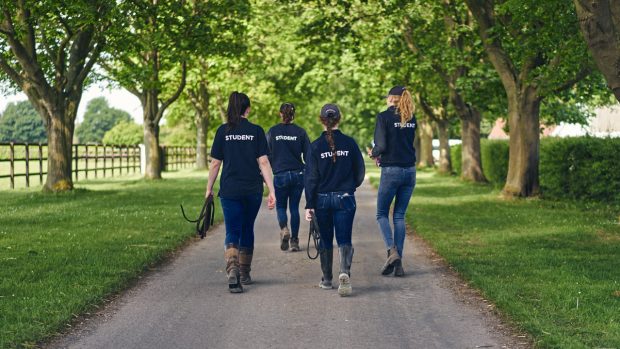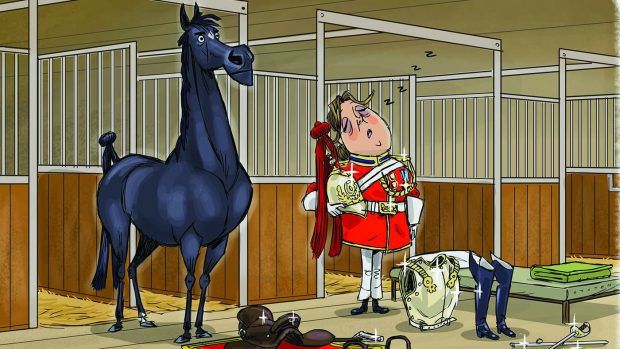From racing to horse care, H&H finds out how to bag your place on some of Britain’s most popular equestrian courses
Hartpury College, BSc (Hons) equine science (pictured above)
The competition: 113 applications for approximately 30 starters in 2016.
The course: the core topics include anatomy, physiology and animal health, with optional subject areas in animal genetics, animal microbiology, equine behaviour, stud management and equine therapy. Full-time in three years, or four years with a sandwich year.
The end goal: examples of graduate employment have included equine veterinary nursing, equine facilities managers, veterinary assistants, laboratory researchers, lecturing and teaching, nutritional sales, nutritional development and equine therapists. Further study can lead onto masters programmes including the MSc equine science or a PhD.
The appeal: “There is an increasing recognition within the equine industry and by prospective students that studying for an equine programme alongside gaining practical and work experience is the ideal preparation for a good career, with Hartpury equine graduates able to hit the ground running whatever career or further study pathway they choose,” says Rosie Scott-Ward, vice principal higher education at Hartpury University Centre.
Get the edge: three A-Levels at BBB or equivalent. This must include a minimum of two A-Levels including one in a biological science and excludes general studies.
Godolphin Flying Start
The competition: 100 applicants for 12 places annually.
The course: a management and leadership training program for the horse racing industry, which includes phases in UK, USA, Ireland, Dubai and Australia. Each trainee receives a full scholarship. Two years full-time.
The end goal: the programme aims to produce thoroughbred industry leaders. Careers include bloodstock, racing, breeding, media, sales, marketing, administration, consultancy and auctioneering.
The appeal: the success of its graduates, the quality of the training and education, and the scholarship.
Get the edge: “Excellent academic backgrounds and full-time employment in the thoroughbred industry — including time spent abroad or promotion to positions of responsibility — help to build towards a Godolphin Flying Start application,” says the programme’s general manager Clodagh Kavanagh.
British Horseracing Authority, British Horseracing Graduate Development Programme
The competition: 200-300 applicants for 20 places.
The course: the programme starts with a two-week residential course, held at the British Racing School in Newmarket, which includes a wide range of lectures from industry experts, field trips, personal development and networking opportunities. Graduates then go on to a paid work experience placement. Course lasts 10-18 weeks, depending on the length of the chosen work experience placement as they range from 8-16 weeks.
The end goal: the careers graduates go on to vary enormously from management positions at racecourses, bookmakers and the press to trainers’ yards, bloodstock sales and broadcasting.
The appeal: the programme is well known and highly regarded throughout the British racing industry, and many of the alumni are now key figures in horseracing. The course itself provides graduates with a wealth of knowledge and career opportunities.
Get the edge: the programme is intended for degree students who are in their final year of university or those who have recently graduated. A passion for horse racing is a must and it is beneficial to have some work experience in the industry.
Royal Agricultural University (RAU), BSc (Hons) international equine and agricultural business management
The competition: 72 applicants for 2016, of which 28 enrolled.
The course: this well-established degree provides a thorough grounding in agriculture, agricultural economics, equine production systems, science, marketing, and finance and business management. A three-year course.
The end goal: graduates go on to a wide variety of careers that include research/industry roles, bloodstock, journalism, event management, racing, farm/livery yard management, marketing and university lecturing.
The appeal: the course is unique and offers an industry relevant qualification that dovetails agriculture with equine science and business. It also gives a unique experience of how the equine industry interacts with land-based activities.
Get the edge: “A science A-level will give you the edge,” says Professor Meriel Moore-Colyer, professor in equine science and director of research and knowledge exchange at the RAU. “And good sound practical experience in both equine and agricultural industries would put you top of the list.”
Like this? You might also enjoy reading these:
How to choose the right equine college and course for you
British Racing School, the apprenticeship in racehorse care
The competition: about 800 applications for 200 places each year.
The course: riding racehorses, taking horses racing, care of horses in the stable and at grass, caring for horses after exercise along with a host of personal development modules for the trainees including fitness training, diet and nutrition, personal safety and finance. The course is residential for 4-14 weeks (depending on prior experience) and then trainees are placed in a racing yard for an apprenticeship that lasts about 18 months.
The end goal: all will begin as riders/grooms, a small number go on to become professional jockeys but many others become travelling staff, yard managers and work riders.
The appeal: It gives young people a fantastic start in the racing world. It prepares them both mentally and physical for riding racehorses and allows those with a love for horses to pursue their goals in a structured, supportive manner.
Get the edge: “We are not interested in academic requirements but those who are successful are very physically fit,” says Carol Bramhill, recruitment manager at the British Racing School. “If a young person can get some experience in a racing yard during school holidays before applying it gives them a great insight into the realities of the job, however, we don’t expect them to be able to ride racehorses before coming.”
This article was first published in the 12 January 2017 issue of Horse & Hound magazine



